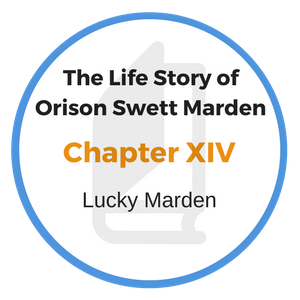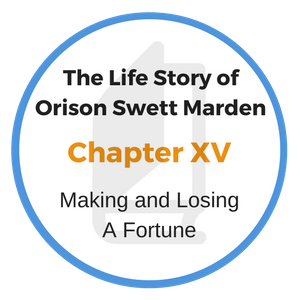- Home
- Self Growth Library
- Orison Swett Marden Chapter XIII
Orison Swett Marden Chapter XIII
Boston Days - Working Through Two Universities
The Life Story of Orison Swett Marden Chapter XIII:
Almost simultaneously, Orison Marden had passed two milestones, his twenty-third birthday and his graduation from an academy. But he was in precarious health. For years he had been burning the candle at both ends.
Nature was calling insistently for rest. For the immediate future he had no definite plans. What should he do?
In his lonely childhood he had puzzled over questions of theology. There was no one to whom he could take his questions. Outdoors, surrounded by God's work, the wonders and beauties of Nature, he had tried to answer them for himself.
Although he was a profound believer in the simple Christianity of the Christ, the thought of entering the ministry apparently had never seriously occurred to him. But the old childish questions that long ago had perplexed and terrified him, when he was obliged to listen to Elder Strong's fire-and-brimstone sermons, may have once more raised the interrogation point in his mind. Whatever the motive, he decided to study theology.
Having been a good student at New Hampton, he had advanced sufficiently to feel that this would not be nearly so difficult for him as the full college course he was anxious to take.
In addition to providing him some time for resting and building up his health, a course of study for the ministry would permit him to solve certain financial problems which must be dealt with. Consequently he entered the junior class in the Theological Seminary at Andover, Massachusetts, where he spent one year. This gave him a groundwork in the science of theology, on which he drew from later in his writings.
Each new plunge into the world of knowledge seemed but to increase his hunger for more. The close of his year at Andover found him with improved health and the feeling of the need of a college education greatly intensified. He therefore lost no time in applying for admission to Boston University, to which he had made up his mind to go. Having passed the freshman's year examinations, he entered the sophomore class in 1874.
While going through the regular university course, he continued to work during summer vacations, first as head waiter and later as manager of summer hotels. In addition, he had started what was known as the "University Club," a dining club for professors and students, conducted along lines similar to those of the one he had managed at New Hampton.
This endeavor netted him only seven dollars a week, but it was clear profit and filled him with the joy of solving his financial difficulties. It is doubtful if any "captain of industry" ever experienced a finer thrill at the successful conclusion of a "big deal" than did the amateur club caterer when he pocketed his first week's earnings. "I felt that I was getting up in the world pretty fast," he naively said, "when I could earn so much money and still be in college!"
A greater triumph was in store. So successful was the Boston University Club that it attracted the attention of President Charles W. Eliot, of Harvard University. He invited the young club manager to Cambridge in order to establish a similar restaurant, on a larger scale, for Harvard.
There were numerous private student clubs throughout Cambridge, but the faculty had long been anxious to create a more democratic spirit in the university by getting the rich and the poor students together in a social way. They wanted to strengthen the collective spirit of the group, and felt that this could best be done by getting the students to sit down together at the same table.
The experiment had been tried in Memorial Hall, a half-million dollar building which had been erected to the memory of the Harvard men killed in the Civil War, but it had failed because of inefficient management. The food was so inferior, and at the same time so expensive, that it pleased none of the students. The club did not in any way meet the needs of the poor ones, who couldn't patronize it, and the rich ones wouldn't. So the program had been reluctantly abandoned.
"After communing with a noble, magnetic personality, have you not felt magnetized, as does a piece of iron on coming in contact with a great steel magnet?"
- O.S. Marden
The friend who said that Doctor Marden had a genius for hotel making did not exaggerate. His ability in that direction had already begun to manifest itself. He took hold of the Harvard problem, which had baffled older and more experienced heads, and solved it to the satisfaction of all concerned.
The plan he submitted worked admirably in bringing the rich and poor students together in Memorial Hall. In fact, it proved so successful that the club remained in existence until the fall of 1924.
President Eliot was so pleased with what the young caterer had accomplished that he recommended him to the trustees of the McClane Asylum, in Somerville, for the position of financial steward. This was a very responsible post for such a young man, the annual expenditure of the institution being about two hundred thousand dollars, a very large sum for that time. So anxious were the trustees to secure his services, however, that, in addition to a large salary, they offered to furnish a tutor to enable him to go on with his studies, if he would accept. He refused the offer, however, as he wished to go on with his work in the college atmosphere.
The institution was the same in which his guardian's son, George, the "fashion model", who had been held up to Orison as a shining example, had formerly held the position of a clerk. That wonderful young man had recently been discharged. Meanwhile the much despised youth who had been urged by George's mother to take him — George — as a pattern, was forging ahead rapidly in his studies, and such an expert had he become in the battle of life that, while still working his way through, he was also beginning to save money.
It was fortunate that he had been able to do this, for the severe strain on his eyes from so much extra study since entering the university had begun to break down. The trouble became so serious that his best friends advised him to give up his plans for completing the course, but he could not be persuaded to do so. Instead, he employed a student to read to him, and managed to go on with his work. His eyes gradually grew better.
"Begin where you are; work where you are; the hour which you are now wasting, dreaming of some far off success may be crowded with grand possibilities."
- Orison Swett Marden
Orison Swett Marden Chapter XIII , continued...
About this time the whole country was stirred by the preparations for the Centennial Exposition, which was opened at Philadelphia in 1876. It was the first great exposition of its kind to be held in this country, and everyone was eager to see it. Young Marden resolved to give up his summer hotel work that year and go to Philadelphia.
"I wanted to see the great exposition," he says, "but I could not afford to go unless I could pay my way. Out of that necessity was born the idea of an exposition publication. So, with the assistance of four other college men, from Harvard and Boston University, I published a magazine called The Centennial Eagle. It gave me a really wonderful experience which I thoroughly enjoyed. As I had a pass to the grounds, there was an excellent opportunity to study the exposition, which I visited nearly every day during the vacation months."
Between work and study there was little time in his strenuous daily routine to see anything of social life, even if his bashfulness would have permitted him to seek it. But, some time later, at the Boston School of Oratory, he was fortunate enough to have a classmate who, though younger than himself, took a great interest in him and invited him to his home.
This was Franklin H. Sargent, the well-known dramatic teacher and director. The friendship then formed between the two young men continued up to the time of Sargent's death, only a short time before that of Marden himself. Through the years they kept in close touch and cherished the warmest affection for each other; and, when death took his old friend, Doctor Marden grieved as he would for a brother.
Sargent belonged to one of the leading families of Boston, which was a center of social activity in the 1870’s. His mother, widow of the Reverend John Turner Sargent, was well known for her social graces and her skill as an entertainer. Their home was an aristocratic and literary center, and it was there that the famous Chestnut Street Club held its Monday evening meetings, at which the celebrities of the day used to gather and speak.
Mrs. Sargent took a kindly interest in her son's friend and did all she could to give the bashful young man from the country a glimpse of the social life of Boston. She frequently invited him to her home, especially for the meetings of the Chestnut Club.
She knew it would be of great advantage to him to meet such men and women as Phillips Brooks, Longfellow, Whittier, Dr. Bartol, James Freeman Clark, Elizabeth Stuart Phelps, Julia Ward Howe, Mary A. Livermore, and others of that stature, who were members of the Club. These he often met at the Sargent home, in which a President of the United States, orators of note, titled foreigners, and many other interesting people had been entertained.
How he enjoyed these new opportunities and how grateful he was to the friends who provided them can hardly be imagined. Totally unaccustomed as he was to meeting people of culture and refinement, other than advanced students and college professors, what he saw and heard at Mrs. Sargent's amazed and delighted him. It awakened and fed the esthetic side of his nature, of which he had not before been conscious.
"It was," he said, "something to remember for a lifetime. I shall never forget how marvelously I was stirred to the very depths of my being by coming in contact with such wonderful characters. To see them, to hear them talk, to mingle with them, was, to one only recently emerged from the backwoods, like tasting a feast up in heaven!"
Of all the famous and interesting people whom he met at the Sargent home, the one who, perhaps, awakened his deepest admiration and love was Phillips Brooks.
"It is contemptible to look down when we may look up, to grovel when we
may soar, or to do the lower when the higher is possible."
"I had such a tremendous admiration for this great man," he says,
"that I actually overcame my bashfulness to the extent of calling on him
at his house in Boston. When I rang the bell my heart was beating like a
hammer, so that I could scarcely tell the servant my errand. The man I
admired so much not only received me, but also sat down beside me on the
sofa and talked to me in the kindest possible way.
I was in my first year in college and he gave me a lot of helpful advice. In fact, he treated me so cordially and talked with me so sympathetically, without making me feel in any sense that I was intruding or taking up his valuable time, that the memory of our interview has remained with me as one of my most treasured possessions. It has had a great influence on my life."
The picture must have stood out vividly in his mind when, years later, after the death of Phillips Brooks, he wrote: "After communing with a noble, magnetic personality, a helpful soul, have you not felt magnetized, as does a piece of iron on coming in contact with a great steel magnet? Have you not felt yourself enlarged and entranced under the spell of a great personality, just as one feels after witnessing a great play, listening to a great orator, or reading a great book? You must have realized the spell often for days; in fact, it never entirely wears away."
"No one is ever again the same who has been touched by one of these godlike natures, one of these lofty minds which stir the divinity that is inherent in every soul and afford a glimpse of one's real self, with all its splendid possibilities."
"Many persons living today almost worship the memory of one such inspiring personality, Phillips Brooks. Filled with an intense belief in man's possibilities, he aroused many a mediocre youth to a realization of the strength that lay dormant within him, made him feel almost like a giant, and inspired him to do things of which he would not otherwise have believed himself capable of. He made those who came in contact with him feel that it is mean and contemptible to look down when we may look up, to grovel when we may soar, or to do the lower when the higher is possible."
Marden's friendship for Sargent was one of the most beautiful things in his life. It was a part of his nature to follow the injunction of Shakespeare:
Those friends thou hast, and their adoption tried,
Grapple them to thy soul with hoops of steel.
When, long after the death of Mrs. Sargent, Fate again brought the two men together in the turbulence of New York life, the friendship of their student days grew into fuller expression. It became something sacred, imperishable, — no, immortal, — for one cannot conceive even "the change called death" severing the tie that bound them.
After his graduation at Harvard, young Sargent had studied oratory at Boston University. He continued his studies under private teachers in the United States and in Europe. After two years' working as a dramatic teacher and instructor in elocution at his alma mater, he moved to New York, where he established the well-known Sargent Dramatic School and became president of the American Academy of Dramatic Arts.
For years Sargent, who never married, was a frequent visitor at Marden's home at Sea Cliff, Long Island. More than anything else, he enjoyed being made one of the family group and became as great a favorite with Mrs. Marden and the children as he was with the Doctor. In the illness preceding his death, Mrs. Marden was as devoted in her attention as her husband was, and grieved for him as sincerely.
Mr. Sargent bequeathed his friend various things he had loved and treasured in life, including his valuable library, which contained many rare volumes. His bequests to him were, in a way, symbolic of the quality of their friendship.
One of Doctor Marden's most treasured possessions was an old-fashioned gold watch left to him by his friend. The watch had a unique interest and precious associations. It had been presented to Sargent's mother by the members of the Chestnut Street Club as a mark of their appreciation of their charming hostess and the many delightful meetings they had had at her home.






